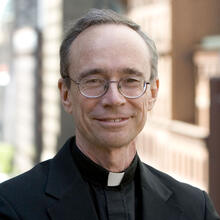(RNS) — Protestant churches have always prided themselves on their preaching and music, especially non-Eucharistic churches that rely on the Bible alone to shape their Sunday services. At the other end of the spectrum are Catholic churches, which have a deep eucharistic tradition and the worst preaching and music in the country.
At least, this is the view of Catholics themselves, according to the Pew Research Center.
Pew did not intentionally plan to make this assessment. It came out of a study, conducted in November and released early this month, of satisfaction with online and in-person church attendance. What they found was that Protestants are much more satisfied with their preaching and music than are Catholics.
The Second Vatican Council attempted to revive Catholic interest in Scripture, but with limited success. Only 36% of Catholics read the Scripture once a month or more.
When U.S. adults were asked how satisfied they were with the sermons they heard online or in person, 82% of Protestants who regularly attended services in person said they were “extremely or very satisfied” with the sermons they hear. For Protestants who regularly watched services on TV or online, 76% were extremely or very satisfied with the sermons.

On the other hand, only 61% of Catholics who regularly attend church in person said they were extremely or very satisfied, a difference of 21 points from Protestants. Similarly, of those Catholics who regularly watch services on TV or online, 57% were extremely or very satisfied, a difference of 19 points.
For Catholics, the heart of the Sunday service has traditionally been the Eucharist, not the Word.
The Second Vatican Council attempted to revive Catholic interest in Scripture, but with limited success. Only 36% of Catholics read the Scripture once a month or more, as compared with 75% of evangelical Protestants, according to Pew.
After Vatican II, the Sunday lectionary was revised so that, in its three-year cycle, Catholics are now exposed to more Scripture than in the past. But you must attend church on Sunday to hear the Scripture, and church attendance has been declining for decades. And while Catholic Scripture scholarship is among the best in the world, Catholic homilies do not always reflect this scholarship.
Likewise, Catholic churches are failing when it comes to music.
Among Protestants, 75% of those who regularly attend services in person and 57% of those who regularly watch on TV or online are extremely or very satisfied with the music. For Catholics, the equivalent numbers are 61% and 50%.

Not only do Catholics do worse than Protestants on preaching and music, they also feel less connected to their fellow congregants. Seventy-one percent of Protestants who regularly attend religious services in person report feeling a great deal or quite a bit of connection with others attending in person. Only 50% of Catholics report the same.
Some might argue that the satisfaction rates for Catholics are not as bad as I portray them. A majority of Catholics are extremely or very satisfied with the preaching and music. Yet when compared with Protestants, Catholics are much less satisfied in their church services than are our Protestant brothers and sisters.
The Catholic Church is in trouble. About 1 out of 3 people raised Catholic have left the Catholic Church, according to a study done by the Pew Research Center in 2011. About half of them become Protestants and half become unchurched.
These Pew surveys raise more questions than answers.
Could some of the former Catholics be attracted by better preaching and music in Protestant churches? Are Catholic services simply too boring? Why are Catholics less connected to their congregation?
Can Catholic priests learn from Protestant ministers how to be better preachers? How can Catholic seminaries do a better job of teaching future priests how to preach? What can be done to improve the preaching of those already ordained?
And how should Catholics improve church music? Are Catholic parishes willing to spend more on professional musicians in order to get better music?
The U.S. Catholic bishops are sponsoring a Eucharistic Revival nationally and in their dioceses. Can they deal with any of these issues?








